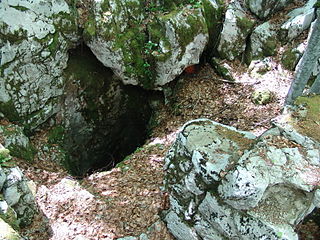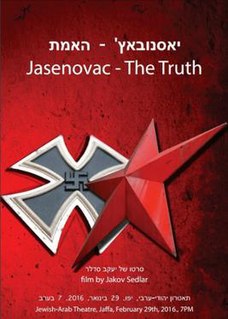
Jasenovac was a concentration and extermination camp established in Slavonia by the authorities of the Independent State of Croatia (NDH) in occupied Yugoslavia during World War II. The concentration camp, one of the ten largest in Europe, was established and operated by the governing Ustaše regime, which was the only quisling regime in occupied Europe to operate extermination camps solely on their own for Jews and other ethnic groups.

The Ustaša – Croatian Revolutionary Movement, commonly known as Ustaše or by anglicised versions Ustasha or Ustashe, was a Croatian fascist, and ultranationalist organization active, as one organization, between 1929 and 1945. Its members murdered hundreds of thousands of Serbs, Jews, and Roma as well as political dissidents in Yugoslavia during World War II.

The Independent State of Croatia was a World War II-era puppet state of Nazi Germany and Fascist Italy. It was established in parts of occupied Yugoslavia on 10 April 1941, after the invasion by the Axis powers. Its territory consisted of most of modern-day Croatia and Bosnia and Herzegovina, as well as some parts of modern-day Serbia and Slovenia, but also excluded many Croat-populated areas in Dalmatia, Istria, and Međimurje regions.

Ljubomir "Ljubo" Miloš was a Croatian public official who was a member of the Ustashe of the Independent State of Croatia (NDH) during World War II. He served as commandant of the Jasenovac concentration camp on several occasions and was responsible for various atrocities committed there during the war. He fled Yugoslavia in May 1945 and sought refuge in Austria. In 1947, he returned to Yugoslavia with the intention of starting an anti-communist uprising. He was soon arrested by Yugoslav authorities and charged with war crimes. Miloš was found guilty on all counts and hanged in August 1948.

Vjekoslav Luburić was a Croatian Ustaše official who headed the system of concentration camps in the Independent State of Croatia (NDH) during much of World War II. Luburić also personally oversaw and spearheaded the contemporaneous genocides of Serbs, Jews and Roma in the NDH.
Dinko Šakić was a Croatian Ustaše official who commanded the Jasenovac concentration camp in the Independent State of Croatia (NDH) from April to November 1944, during World War II.
Far-right politics in Croatia refers to any manifestation of far-right politics in the Republic of Croatia. Individuals and groups in Croatia that employ far-right politics are most often associated with the historical Ustaše movement, hence they have connections to Neo-Nazism and neo-fascism. That World War II political movement was an extremist organization at the time supported by the German Nazis and the Italian Fascists. The association with the Ustaše has been called "Neo-Ustashism" by Slavko Goldstein.

The Genocide of the Serbs was the systematic persecution of Serbs which was committed during World War II by the fascist Ustaše regime in the Nazi German puppet state known as the Independent State of Croatia between 1941 and 1945. It was carried out through executions in death camps, as well as through mass murder, ethnic cleansing, deportations, forced conversions, and war rape. This genocide was simultaneously carried out with the Holocaust in the NDH as well as the genocide of Roma, by combining Nazi racial policies with the ultimate goal of creating an ethnically pure Greater Croatia.
Ante Ciliga was a Croatian politician, writer and publisher. Ciliga was one of the founders of the Communist Party of Yugoslavia (KPJ). Imprisoned in Stalin's Gulags in the 1930s, he later became an ardent nationalist and anti-Communist.

Full diplomatic relations between Croatia and Israel were established on April 9, 1997 following Croatia's independence from SFR Yugoslavia. Croatia has an embassy in Tel Aviv and honorary consulates in Ashdod, Caesarea, Jerusalem and Kfar Shmaryahu. Israel has an embassy in Zagreb. Relations between the two countries are described as friendly and highly cooperative. In recent years, Croatia and Israel intensified bilateral relations and cooperation in the field of defence and security. Croatia is one of the countries Israel occasionally turns to inside the EU to advocate on its behalf and it generally abstains or votes with Israel on key EU votes at the UN. Israeli president Reuven Rivlin described Croatia in 2019 as "Israel's strong ally in the EU, the UN and other multilateral organizations."

The Jadovno concentration camp was a concentration and extermination camp in the Independent State of Croatia (NDH) during World War II. Commanded by Juco Rukavina, it was the first of twenty-six concentration camps in the NDH during the war. Established in a secluded area about 20 kilometres (12 mi) from the town of Gospić, it held thousands of Serbs and Jews over a period of 122 days from May to August 1941. Inmates were usually killed by being pushed into deep ravines located near the camp. Estimates of the number of deaths at Jadovno range from 10,000 to 68,000, mostly Serbs. The camp was closed on 21 August 1941, and the area where it was located was later handed over to the Kingdom of Italy and became part of Italian Zones II and III. Jadovno was replaced by the greater sized Jasenovac concentration camp and its extermination facilities.

The Jastrebarsko children's camp held Serb children who had been brought there from various areas of the Axis puppet state, the Independent State of Croatia, during World War II. The children had been captured as a result of massacres and counter-insurgency operations conducted by the genocidal Ustaše-led government, its Axis allies and other collaborators since the Axis invasion of Yugoslavia and establishment of the NDH in April 1941. The camp was located in the town of Jastrebarsko, about 37 kilometres (23 mi) southwest of the NDH capital, Zagreb, and operated from 12 July until October 1942. Camp administration was provided by nuns of the Daughters of Charity of Saint Vincent de Paul order, with Ustaše guards.

The Holocaust in the Independent State of Croatia is a term which is primarily used in reference to the genocide of Jews, but sometimes, it is also used in reference to the genocide of Serbs and Romani (Porajmos), within the Independent State of Croatia, a fascist puppet state which existed during World War II, was led by the Ustaše regime, and ruled an occupied area of Yugoslavia which included most of the territory of modern-day Croatia, the whole of modern-day Bosnia and Herzegovina and the eastern part of Syrmia (Serbia). Of the 39,000 Jews who lived in the NDH in 1941, the United States Holocaust Memorial Museum states that more than 30,000 were killed. Of these, 6,200 were shipped to Nazi Germany and the rest of them were killed in the ISC, the vast majority were killed in Ustaše-run concentration camps, such as Jasenovac. The Ustaše were the only quisling forces in Europe who operated their own extermination camps for the purpose of killing Jews and members of other ethnic groups.

Josip Jurčević is a Croatian historian, historical negationist and politician.
Jakov Sedlar is a Croatian film director and producer. A former cultural attaché during the 1990s in the Franjo Tudjman government, his documentaries promote Croatian nationalist views through propaganda. His 2016 documentary Jasenovac – The Truth sparked controversy and condemnation for downplaying and denying the crimes committed at the Jasenovac concentration camp by the Ustaše during World War II, instead focusing on crimes supposedly committed against Croats by communist partisans at the camp following the war, while using alleged misinformation and forgeries to present its case, in addition to naming former and current Croatian officials, intellectuals, historians and journalists it dubs as "Yugoslav nationalists concealing the truth".

Jasenovac – istina is a 2016 revisionist documentary film by the Croatian filmmaker Jakov Sedlar. The film contends that the extent of the Holocaust in Croatia and the World War II-era genocide of the country's Serb population was exaggerated through post-war communist propaganda. It focuses primarily on Jasenovac, a concentration camp run by Croatia's wartime fascist Ustaše government where an estimated 100,000 are believed to have perished, and suggests that the actual death toll never exceeded 18,000. The film also argues that Jasenovac continued being used as a concentration camp by Yugoslavia's communist authorities well after World War II, and that more inmates perished when it was run by the communists than when it was run by the Ustaše.

Marijan Mijo Babić (1903–1941), nicknamed Giovanni, was a deputy of the Croatian fascist dictator Ante Pavelić, and the first commander of all concentration camps in the Independent State of Croatia. He was head of the Third Bureau of the Ustasha Surveillance Service, and was also a member of the Main Ustaše Headquarters, one of the two main deputies of Pavelić.
Antun Najžer, also known by the hypocorism Ante Najzer, was a Croatian physician and member of the fascist Ustaše movement who served as the commander of the Sisak children's concentration camp in the Independent State of Croatia during World War II. He was dubbed the "Croatian Mengele" by survivors due to conducting medical experiments on his victims. For these crimes, in September 1946 he was sentenced to execution by a firing squad.
Ljubica Štefan, was a Croatian historian. She was awarded honorific title Righteous Among the Nations.
Stjepan Razum is a Croatian church historian and Roman Catholic priest. He is the director of the Archdiocesan Archives in Zagreb and a member of the Commission for the Croat martyrology of the Episcopal Conference of Bosnia and Herzegovina and Episcopal Conference of Croatia; mainly researching on the Catholic priests and nuns killed and persecuted by Yugoslav communists.












